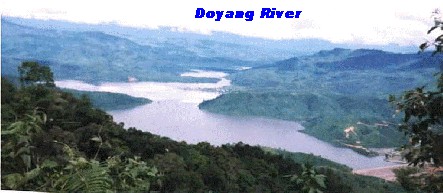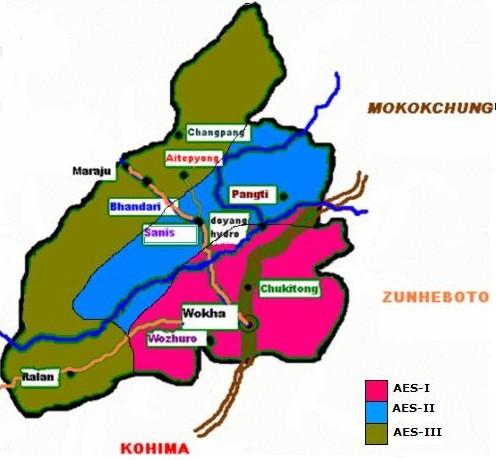













 |
About Wokha District
Wokha District is the home of the Lothas. WO in Lotha
means NUMBER of PEOPLE and KHA means the COUNTING. So the place in which
Lotha ancestors had gathered together and counted their numbers was named
WOKHA. In December 1973, Wokha was raised to the status of a separate
District. Earlier to this it was one of the sub-division under Mokokchung
District. The total geographical area of the district is 1628 sq km with a
population of 1,61,098 as per 2001 census. The district is located at an
altitude of 1313 MSL with maximum and minimum temperature of 30’C and 10’C
respectively. The district receives ample amount of rainfall ranging from
1500-2000 mm annually.
Agriculture constitutes the main occupation for nearly
80% of the population of Wokha District. The primitive method of
cultivation, i.e., Jhum system of cultivation is still in practice
covering major parts of the district covering an area of 13382 under Jhum
cultivation. The farmers of the district also practice the terrace system
of cultivation which is however, negligible as most of the farmers of the
district are economically very poor and cannot afford to adopt such system
of cultivation. The lower plain areas of the district such as Baghty and
Ralan are very potential areas where agriculture and all other allied
activities can be taken up on a large scale.
The main crops of the district are rice, maize, beans,
peas, yam, brinjal, chilly, pumkin, ginger, tomato, bitter-gourd etc.
Horticulture products consist of orange, banana, pineapple, papaya
,passion fruit, guava, plum, pear etc.
|
Year of formation |
1973 |
|
Area |
1,628 sq. km |
|
Altitude |
1,313 msl |
|
Latitude |
26.1° N |
|
Longitude |
94.27° E |
|
Population (2001) |
1, 61,098 |
|
Males |
83,620 |
|
Females |
77,478 |
|
Population density |
99 per sq. km |
|
Sex Ratio |
927 females per 1000 males |
|
No. of Blocks |
05 |
|
Average rainfall |
2000 to 2500 mm. |
|
Temperature |
Max.: 32°C; Min.: 2°C |
|
|
Administration setup:
Wokha district is headed by
Deputy Commissioner with its headquarter at Wokha town. For smooth and
effective functioning, the district is divided into various divisions.
Bhandari sub-division is headed by A.D.C, Sanis by SDO(C), Merapani by
Border Magistrate and the rest by E.A.C. EAC headquarter Englan is a newly
established headquarter inaugurated on 10th of November, 2008. Wokha
district is divided into 5(five) numbers of Rural Development Blocks viz.
Wokha, Chukitong, Wozhuro/Ralan, Bhandari and Sanis block for proper
implementation and monitoring of the developmental activities at various
levels.
|
Administrative Centres
|
a) Wokha (District Hqr.)
b) Bhandari (A.D.C.)
c) Sanis SDO (C)
d) Merapani (Border Magistrate)
e) Chukitong (E.A.C)
f) Lotsu (E.A.C)
g) Wozhuro (E.A.C)
h) Changpang (E.A.C)
i) Aitepyong (E.A.C)
j) Sungro (E.A.C)
k) Ralan (E.A.C)
l) Baghty (E.A.C)
m)Englan(EAC) |
Natural Resources
Oil And Natural Gas Commission (ONGC Changpang)
Changpang is situated in the
Lower Lotha Range in the Bhandari Sub-Division. It is around 120 Kms far
from the Wokha District Hqrs. ONGC started survey works as early as 1963
in the Changpang area of Nagaland under Wokha District. The survey report
indicated that there is sufficient Hydro Carbon (Crude Oil) deposits all
along the Nagaland Foothill adjoining Assam. This belt is geographically
known as “SCHUPPEN BELT”. ONGC discovered oil in the Changpang area and
the trial production started in March, 1981.
The Nagaland State Government
stopped all ONGC activities on the 2nd of May, 1994, on matters of
Government policy. However, presently there are on-goings talks among the
Lothas, Government of Nagaland and the ONGC, for the resumption of
operation for exploration and production of petroleum products in the
Changpang oil fields.
Rivers of the District

Important rivers which flow
through the district are Doyang, Chubi, Nzhu and Nruk. Among these, the
most popular and the biggest is the Doyang river which flows through the
district. The Doyang Hydro Electric Project of the North Eastern Electric
Power Corporation Ltd. is being constructed on this river which is
situated in Wokha Sadar, 26 Kms from the Wokha district Hqrs. The Doyang
Hydro Electric Project (DHEP) covering an area of 3487 ha, was
commissioned in the year 2000. It will generate 75 MW of electricity. The
commercial operation of the DHEP started w.e.f. 11/07/2000. Apart from the
power, fishery is also being promoted in the said river.
Agro ecological Situations (AES) of the district.
Based on the Agro-Ecological Situation the district has been divided into
three zones as AES-I, AES-II & AES III.
AES-I:
AES I of Wokha district covers
two blocks, i.e., Wokha and Chukitong block. The altitude of this AES
ranges from 750-1350m asl and the soil are mostly acidic. The average
annual rainfall is about 2000-2500 mm. Major enterprises of this situation
are agriculture, horticulture and animal husbandry. Major crops grown are
paddy, maize, sugarcane, chilly, brinjal, beans, orange, passion fruit and
ginger etc.
AES-II:
AES II covers only one block
named Sanis block. The altitude of this AES ranges form 165-720m asl. Soil
is acidic with a pH range of 4.5-5.5. The major crops grown include paddy,
maize, chilly, ginger, yam and varieties of vegetables such as cabbage,
knoll-khol, mustard, etc. and horticultural crops such as banana, citrus,
pineapple, litchi, jackfruit etc. Animal husbandry and fish farming are
also practiced by the farmers.
AES-III:
AES III of Wokha district
covers Bhandari and Wozhuro-Ralan block. The altitude of this AES ranges
from 110-304msl. The average annual rainfall is about 2000-2500 mm. Major
crops grown are paddy, maize, chilly, brinjal, cabbage, cauliflower, tea,
mange, banana, litchi coconut etc. Fish farming and animal husbandry are
also taken up.

AGRO-ECOLOGICAL
SITUATION MAP OF WOKHA DISTRICT
|